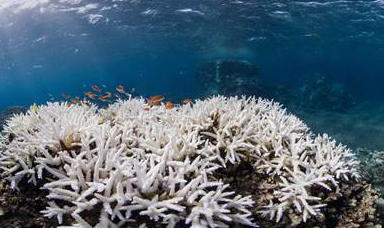Partner-swapping may not lead to long-term success for coral reefs
Mumbai: Research led by Victoria University of Wellington has cast doubt on the ability of coral reefs to adapt to climate change.
The research team, led by Professor Simon Davy, Head of Victoria’s School of Biological Sciences, took an in-depth look at a type of micro-alga that lives in symbiosis with reef corals.
Symbiodinium trenchii (S. trenchii) can survive in warmer waters than many other types of symbiotic algae, and has shown potential in supporting coral reefs to adapt to climate change.
“The micro-algae that live in the cells of corals produce sugars that are essential to the coral—giving it the energy it needs to grow,” says Professor Davy. “When temperatures rise—by even a few degrees—the stress can cause the corals to lose their algae, which leads to the phenomenon of coral bleaching. If the algae are lost for more than a few weeks, the corals die.”
It has been hypothesised that S. trenchii could have the potential to occupy the space left by more temperature-sensitive algae, which may allow corals to recover from bleaching.
The research—recently published in the journal Proceedings of the National Academy of Sciences of the United States of America—looked at a number of factors that may arise when corals form a new partnership with S. trenchii, to assess the impact this swap has on the coral. Other members of the research team were Victoria University PhD student Jennifer Matthews and researchers from Oregon State University, the Carnegie Institution for Science at Stanford and the University of Melbourne.
“Not much is yet known about what happens when you swap the partners around. It’s one thing to form a new symbiosis, but unless the new algae can provide enough nutrition and resources to the coral for it to build The research team, led by Professor Simon Davy, Head of Victoria’s School of Biological Sciences, took an in-depth look at a type of micro-alga that lives in symbiosis with reef corals.itself and continue growing, it’s not going to be a long-term solution,” explains Professor Davy.
The researchers looked at the sea anemone Aiptasia, a globally-adopted model organism for the study of the coral-algal symbiosis.
“The introduction of the new algae into the sea anemone caused it physiological stress and triggered its immune response as it tried to get rid of the new algae. In addition, there were signs that these new algae were less able to meet the nutritional needs of the sea anemone.
“Coral reefs are home to millions of species, and have social and economic value for many communities and countries around the world. Their dramatic global decline in the 21st Century means that we need to urgently find ways to protect them.”
Professor Davy says some coral reefs could potentially survive climate change by colonising new areas in cooler water, but corals are unable to adapt fast enough to the pace of climate change.
“There are some people looking at options to support coral reefs, such as selectively breeding more thermally tolerant corals or seeding the reefs with particular algae—and S. trenchii had looked like it was a good candidate for this.
“What we see now is that the stress and loss of nutritional benefit caused by the introduction of a new type of alga, may not always make it possible for the symbiosis to persist long-term,” says Professor Davy.
The next stage of the research is to look at the long-term impacts of this change in both the Aiptasia model system and actual reef corals, to see if these negative responses are reduced over time. This work is being conducted, in part, at the Hawaii Institute of Marine Biology.
This research project was supported by the Marsden Fund Council from Government funding, managed by the Royal Society Te Apārangi.

